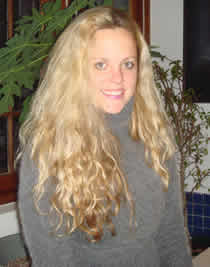 Rare Bird is true story of a boy who helped ï¬nd a bird believed extinct for over 300 years. This against all odds story about a struggle for survival takes a dramatic turn, when the bird faces a greater threat. Ravaged by a hurricane what will they do to save the species once again from oblivion?
Rare Bird is true story of a boy who helped ï¬nd a bird believed extinct for over 300 years. This against all odds story about a struggle for survival takes a dramatic turn, when the bird faces a greater threat. Ravaged by a hurricane what will they do to save the species once again from oblivion?
Bermudian ï¬lmmaker, Lucinda Spurling has spent the last several years in her home country pursuing her first feature documentary, Rare Bird. After graduating with a degree in Communications from Tulane University, she worked as a journalist before attending Bristol University (Bristol, UK) where she obtained her Masters in Film and Television with distinction in 2000. Lucinda worked as a ï¬lm editor in the UK, and in a variety of roles on independent ï¬lms. In 2002 she left her editing career in the UK and returned to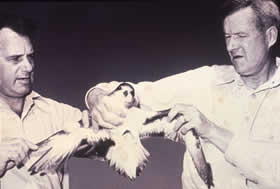 Bermuda where she started her own independent film production company: Afflare Films.
Bermuda where she started her own independent film production company: Afflare Films.
Cinema Without Borders: What did inspire you to make the Rare Bird?
Lucinda Spurling: The story of the cahow is truly incredible, for humanity to have a second chance 325 years after believing they had driven a species into extinction is rare and extraordinary.
It was the extraordinary nature of the story and my personal interest in 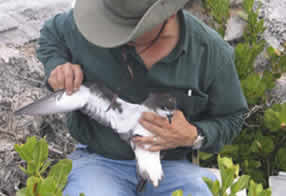 endangered species that pushed me to make Rare Bird. However, the character of David himself is also an inspiration. I met David Wingate when I was a child, and to a person of any age or experience, his passion for his cause radiates. The idea that one person in one lifetime can save a species from extinction encapsulates the notion that one person can make a difference for the world. This is a truth that is often lost in the doom and gloom of global warming and the long-term nature of conservation.
endangered species that pushed me to make Rare Bird. However, the character of David himself is also an inspiration. I met David Wingate when I was a child, and to a person of any age or experience, his passion for his cause radiates. The idea that one person in one lifetime can save a species from extinction encapsulates the notion that one person can make a difference for the world. This is a truth that is often lost in the doom and gloom of global warming and the long-term nature of conservation.
CWB: To many people global warming has no chance of being stopped. But 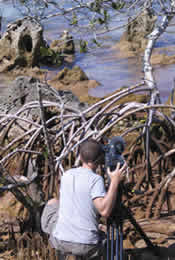 Rare Bird offers hope. Did you want to tell us we should not give up hope and we must find ways to resolve this threat?
Rare Bird offers hope. Did you want to tell us we should not give up hope and we must find ways to resolve this threat?
Lucinda: There is this false idea in society today that there is nothing we can do to slow down global warming or that it is actually a natural phenomenon. Although the world has warmed and cooled over millions of years, what we are experiencing now is of our own creation, or rather destruction! We can absolutely slow down its effects by cutting back emissions etc, without destroying our economy. I encourage everyone to rent, An Inconvenient Truth, a fantastic documentary detailing the facts from the fiction in the science of global warming and suggests a course of action, for our world to take to combat our environmental crisis before it really is too late. How this all relates to Rare Bird… is of course the impact global warming is currently having on these remarkable birds who have overcome every other possible obstacle. The film is meant to be an inspirational tale of man and bird overcoming the impossible. So often all you see 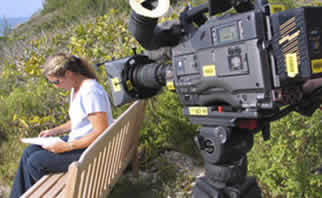 in documentaries are tales of social or environmental woe and hardship. Although these films are important for audiences, so are the positive stories, which can inspire not by horror but by example. Rare Bird offers hope for a world too easily ready to give up and become complacent about destructive trends in the environment. With species disappearing all around us, it mystifies me how blind people are to the fact that what happens to them will end up happening to us.
in documentaries are tales of social or environmental woe and hardship. Although these films are important for audiences, so are the positive stories, which can inspire not by horror but by example. Rare Bird offers hope for a world too easily ready to give up and become complacent about destructive trends in the environment. With species disappearing all around us, it mystifies me how blind people are to the fact that what happens to them will end up happening to us.
CWB: Is Rare Bird a real story? How did you find the boy in your movie?
Lucinda: Rare Bird is a true story, a remarkable true story. I met David Wingate when I was a child, and he is a godlike character in Bermuda, always visibly championing his cause.
When I met with him about this project he was eager to participate to get his message out to the world. Personally I was taken![]()
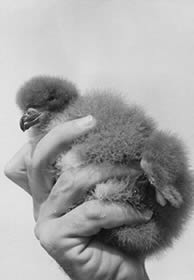 aback that although he is a legendary figure in the conservation world, and runs one of the oldest conservation projects in the world, no one had written a book about him or made a film. David has written many articles, and appeared in many articles and television segments, and has been lauded by many organizations and governments around the world, but the wider audience had not been reached. This I undertook as my challenge with Rare Bird.
aback that although he is a legendary figure in the conservation world, and runs one of the oldest conservation projects in the world, no one had written a book about him or made a film. David has written many articles, and appeared in many articles and television segments, and has been lauded by many organizations and governments around the world, but the wider audience had not been reached. This I undertook as my challenge with Rare Bird.
CWB: What were the challenges you faced making the Rare Bird?
Lucinda: There were many challenges with Rare Bird, as with any long-term film project.
The main challenges were that the bird was nocturnal and because of their limited numbers and protection from people our access to them was limited, this made filming an unknown quantity. Another obstacle was with funding, as many funders rejected me on the grounds that the film was not educational; there seems to still exist the perception that documentary is not a worthy art or educational form. Lucky for us, our main sponsors disagreed and were able to fill in the gaps and we finished Rare Bird in 2006. Likewise we are also still working on the challenge of distribution; we have had interest from several companies but nothing has materialized.
Also I think any film about the environment and animals has a challenge up against films about human suffering. I remember reading an amazing book by Tony Jupiter, called “Spix’s Macaw: The Race to Save the World’s Rarest Bird.” Where he says 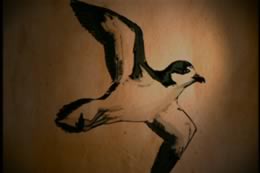 the following about the day the last Spix Macaw died in the wild signaling the extinction of one of the rarest and most beautiful of the world’s birds: “ Before our eyes, the most closely observed extinction of a wild species ever to take place had just occurred. But while news bulletins broadcast images of the Afghani Taliban blasting with anti tank artillery unique thousand year old Buddha statues carved into an ancient mountainside, the world heard hardly a murmur about the loss of Spix’s fabulous blue macaw. It was one more reminder of the human propensity to regard the destruction of its own creations as tragic and immoral while the annihilation of one of Creation’s raises hardly an eyebrow.”
the following about the day the last Spix Macaw died in the wild signaling the extinction of one of the rarest and most beautiful of the world’s birds: “ Before our eyes, the most closely observed extinction of a wild species ever to take place had just occurred. But while news bulletins broadcast images of the Afghani Taliban blasting with anti tank artillery unique thousand year old Buddha statues carved into an ancient mountainside, the world heard hardly a murmur about the loss of Spix’s fabulous blue macaw. It was one more reminder of the human propensity to regard the destruction of its own creations as tragic and immoral while the annihilation of one of Creation’s raises hardly an eyebrow.”
I hope that Rare Bird bridges this gap in the attention span of audiences by telling a story about another race to save an endangered species of bird, but along with it the story of a man’s life, full of tragedy, setbacks, and accomplishments.
CWB: How long did it take to make the Rare Bird ? Were you sure which direction you were heading with your film or it was 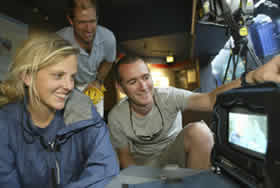 more a spontaneous adventure?
more a spontaneous adventure?
Lucinda: It took 2 and a half years of production and of course we are still working on the distribution and educational outreach of the film while beginning the next project.
I was sure of the direction the film was going, however we found it difficult to manage all the facets of the story in the edit, we have David’s personal story, the story of the island, the story of the bird, then the story of Nonsuch and global warming. It was a lot to pack in, and some of the history was a challenge to articulate, especially when you have three men all related but all with the same name, Louis Mowbray one, two and three! One of the last things to come together was the footage of the bird flying in the wild; it was the last thing we shot before we went into the online. I was desperate as we tried for several years and came up with nothing. In the 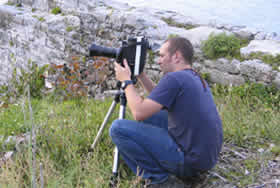 end we were very lucky and what you see in the film is the only footage of the cahow flying in the wild in existence. For a few weeks in November the cahow can be seen right before sunset when they congregate at sea and begin courtship displays; this happens just before nightfall before they fly into the nesting islands.
end we were very lucky and what you see in the film is the only footage of the cahow flying in the wild in existence. For a few weeks in November the cahow can be seen right before sunset when they congregate at sea and begin courtship displays; this happens just before nightfall before they fly into the nesting islands.
CWB: What was the reaction of the audience in Bermuda to the film?
Lucinda: Bermudians loved Rare Bird, and many felt this portrait of David and his work was far overdue. Although most people in Bermuda know the basic story of the cahow, virtually no one has ever seen a cahow. Rare Bird was an opportunity to show the people of Bermuda our special bird, without compromising their security and habitat out on the nesting islands
CWB: Please tell how Rare Bird has been received in different countries? 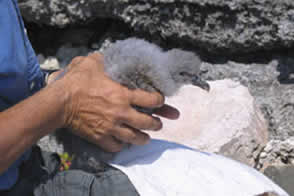
Lucinda: Santa Barbara will be our US premiere, so I will let you know. The film will also be screening at the Sedona film festival in FEB/March and at the Washington D.C. Environmental Film Festival in March. At the Bermuda Film Festival we were awarded a special mention in the best documentary category and received several flattering reviews, including four stars from Film Threat.com
CWB: What are your future projects?
Lucinda: I am currently starting a historical film, so a slight departure from my environmental work, but I hope to return to the nature genre with another 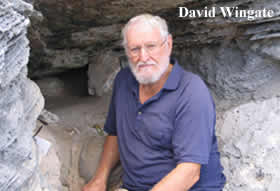 film about the endangered green turtle.
film about the endangered green turtle.
CWB: Please tell us about the movies and filmmakers that you like.
Lucinda: I loved the film Born into Brothels because it worked on so many levels, not only a portrait of the plight of children in the red light district, but also a film about the visual art form, and a story about making a difference and changing these children’s lives. I also love Ross McElwee, his film Sherman’s March is one of the films that made me want to be a filmmaker. Yet another one is Never Cry Wolf, although a docudrama rather than a documentary, it inspired me to make nature films.

